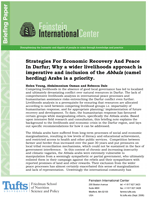Competing livelihoods in the absence of good local governance has led to localized and ultimately devastating conflict over natural resources in Darfur. The lack of comprehensive livelihoods analysis in international peace processes and humanitarian assistance risks entrenching the Darfur conflict even further. Livelihoods analysis is a prerequisite for ensuring that resources are allocated according to need between competing livelihood groups i.e. impartiality of humanitarian response, and for appropriate planning/implementation of future recovery and development. To date, the humanitarian response has favored certain groups while marginalizing others, specifically the Abbala arabs. Based upon intensive field research and consultation, this briefing note explains the background to the livelihoods and economic crisis in the Darfur region, and lays out specific recommendations for how it can be addressed.
Strategies for Economic Recovery and Peace In Darfur

July 2007
ASSOCIATED PROJECT
SUBJECTS
PUBLICATION TYPE
LOCATION
RELATED PUBLICATIONS
This desk study explores how state-owned policies and programs in pastoral areas of the Sudano-Sahel and the Greater Horn of Africa meet pastoralists’ needs and priorities.
•
October 2024
This report outlines an anticipatory insurance product designed to support farmers in the drought-prone regions of Malawi and Zambia.
•
August 2024
The time pressure involved in designing and implementing anticipatory action can discourage the localization of decision-making. Learn more from a cartoon-infused summary of insights.
•
July 2024
Early Warning Systems can reduce deaths and damages caused by extreme weather events, if investors address gaps in communication and planning. Learn more from a cartoon-infused summary of insights.
•
July 2024
This synthesis report reflects upon Phase 1 findings on humanitarian action in pastoral drylands of the Greater Horn and Sudano-Sahel.
•
June 2024
This desk study examines common perceptions of pastoralism among humanitarians and barriers to international humanitarian systems meeting pastoralists’ needs.
•
June 2024






